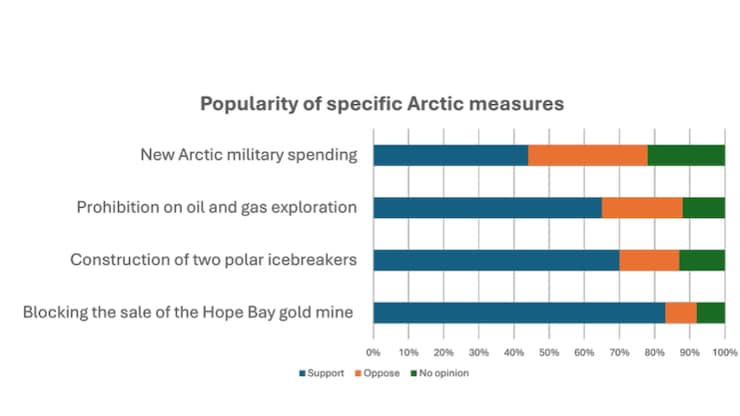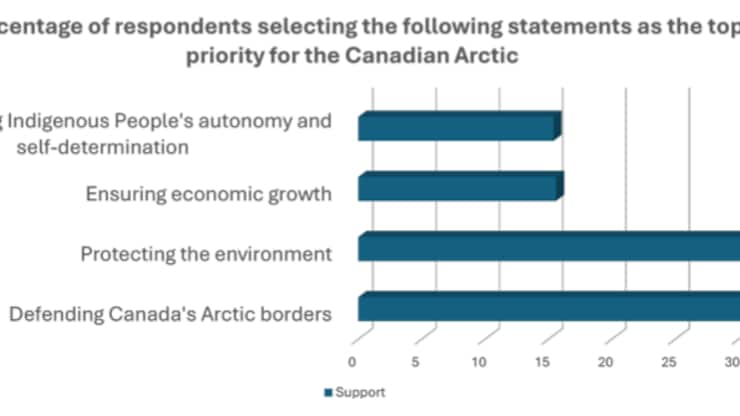Canada News
Survey shows Canadians fear losing Arctic territory without stronger action
By Eilís Quinn, Eye on the Arctic, @arctic_eq, CBC News, RCI

A landscape in Arctic Canada near the hamlet of Taloyoak in Nunavut. (Eilís Quinn/Eye on the Arctic)
Even before President-elect Donald Trump sparked global headlines with his public musings about buying Greenland and posting memes showing Canada and its Arctic as part of the United States, Canadians had already been signaling growing concerns over the future security of the Arctic—and the possibility that Canada could lose its grip on the region if it doesn’t act decisively, a survey revealed.
The poll conducted by the Observatory on Politics and Security in the Arctic (OPSA), a research unit of the Centre interuniversitaire de recherche sur les relations internationales du Canada et du Québec, revealed that over half of Canadians—55 per cent—believe conflict will define the Arctic’s future. In addition, 73 per cent of respondents sad the believed that Canada might lose part of its Arctic unless the country stakes a stronger presence in it.
The results were released at the end of 2024, with the opinion poll conducted from July 30 to August 12, 2024 amongst 2,085 Canadians in Canada’s ten provinces.
I was quite surprised to see that high of a number agreeing that we could lose territory,
Mathieu Landriault, OPSA’s Director, told Eye on the Arctic. “And that’s even before all of the stories [on President-elect Donald Trump’s statements] we’ve seen in the last few days.
Canadians’ worries regarding the Arctic were also reflected in how they wanted Canada to tackle Arctic issues. Most respondents wanted Canada to take a stronger stance on territorial disputes, with 49 percent favoring a confrontational approach. A smaller group, 32 percent, supported negotiating and compromising with other countries over Arctic borders.
Popularity of Arctic initiatives
When asked about government initiatives concerning the Arctic, the opinion poll found strong approval from respondents.

Initiatives like blocking the Chinese purchase of an northern gold mine, and constructing new icebreakers were moves widely supported amongst respondents. (OPSA) Photo: (OPSA)
Eighty-three per cent of the Canadians surveyed said they supported Ottawa’s decision to block the sale of the Hope Bay gold mine to a Chinese company, citing national security concerns.
The plan to build two new polar icebreakers also received widespread support, with 70 per cent of respondents backing the proposal. When it came to government’s ban on oil and gas exploration in Arctic waters, 65 per cent of Canadians agreed, while 44 backed increased military investments in the region.
Support for greater territorial autonomy
But it’s not just about protecting territory—Canadians also want to see more autonomy granted to the three northern territories. The survey found that 63 per cent of respondents believe the northern territories should have more self-governance, suggesting support for increased local leadership in managing Arctic affairs.
Canadians also agreed that defending the Arctic’s borders and protecting the environment should be the country’s top northern priorities.

Defending Canada’s Arctic borders was the top priority for Canadians, closely followed by environmental protection. (OPSA) Photo: (OPSA)
Forty-three per cent expressed concerns about the environmental impact of Arctic mining projects, while 39 per cent said they were in favor of such development.
When it comes to awarding contracts for Arctic development, forty-four per cent said the government should prioritize environmentally responsible companies, rather than just choosing the lowest bidder.
Opinions in northern territories to be surveyed next
The survey was funded by the Secrétariat du Québec aux relations canadiennes.
Landriault said there’s little opinion polling of Canadians on Arctic issues specifically and the results give an important snapshot of citizens’ concerns.
There’s recent polls done in Greenland and Alaska frequently has polls, but the last poll of Canadians specifically on Arctic issues that comes to mind was back in 2015,
he said. The main reason behind this survey was to update these perceptions and see how Canadians think about their Arctic region.
OPSA is next preparing a poll surveying only residents of Canada’s three northern territories on their perceptions of Arctic issues.
This article is republished from RCI.





















